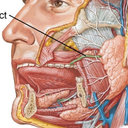Harmine shows therapeutic activity on Nicotine-induced liver failure in mice.
מילות מפתח
תַקצִיר
This experiment evaluated the effects of harmine against nicotine-induced damage to the liver of mice. Nicotine is a major toxic component of cigarette smoke and a major risk factor for functional disorders in the liver, because it induces oxidative stress. Harmine is a harmal-derived alkaloid with therapeutic and antioxidant properties. In this study, 80 male mice were randomly assigned to 10 groups: the normal control and nicotine control groups (2.5 mg/kg); the harmine groups (5, 10, 15, and 20 mg/kg), and the nicotine + harmine groups (5, 10, 15 and 20 mg/kg mg/kg). Treatments were administered intraperitoneally daily for 28 days. Nitric oxide (NO) level, aspartate aminotransferase (AST), alanine aminotransferase (ALT), and alkaline phosphatase (ALP) concentrations were determined. In addition, thiobarbituric acid reactive species, antioxidant capacity, and the diameters of the hepatocytes and central hepatic vein (CHV) were investigated. Nicotine administration significantly improved liver MDA and NO levels, CHV and hepatocyte diameters, and liver enzymes, and it decreased tissue FRAP levels compared to the normal control group (p<0.05). In the harmine and harmine + nicotine groups, in all dosages, all measured factors decreased significantly, while the FRAP tissue level increased compared with the nicotine control group (p<0.05). It seems that liver injury was improved by harmine administration in mice because of nicotine.


